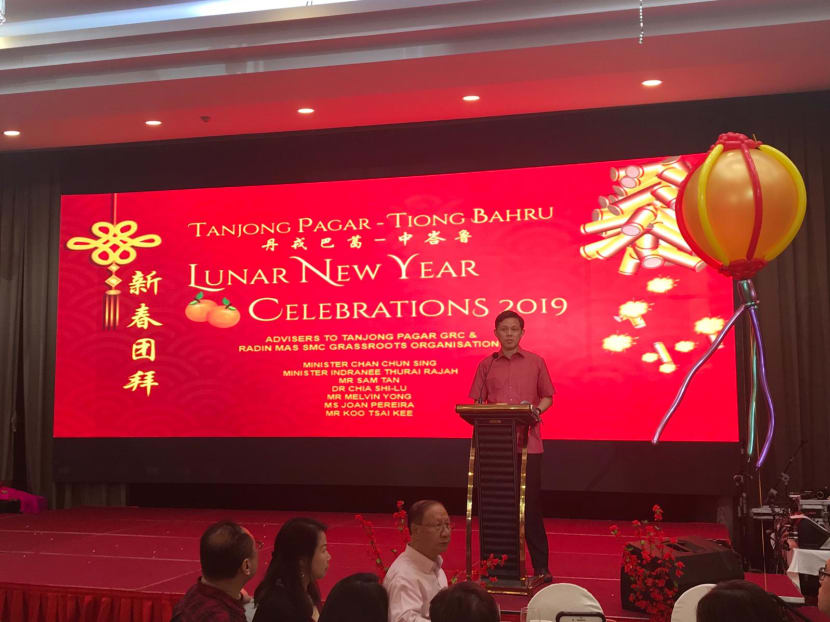‘Wider, deeper societal forces’ behind bilateral, international tensions: Chan Chun Sing
SINGAPORE — Singaporeans have to be aware of the "wider and deeper societal forces" behind the Republic's bilateral disputes with Malaysia and the United States-China trade tensions, Trade and Industry Minister Chan Chun Sing has said.

Trade and Industry Minister Chan Chun Sing at the Chinese New Year dinner in his Tanjong Pagar-Tiong Bahru ward.
SINGAPORE — Singaporeans have to be aware of the "wider and deeper societal forces" behind the Republic's bilateral disputes with Malaysia and the United States-China trade tensions, Trade and Industry Minister Chan Chun Sing has said.
Noting that some might be quick to attribute such issues to certain personalities or leaders, he said that this is “too simplistic a view”.
“We cannot afford to have such a narrow understanding of the world around us,” Mr Chan said in a speech at a Chinese New Year dinner at his Tanjong Pagar-Tiong Bahru ward on Saturday (Feb 9) evening.
“We would have to be cognisant of the wider and deeper societal forces in the different countries that are, in turn, driving these personalities and their actions. If we don’t, we risk misreading the situation and this could hamper our ability to respond effectively in our management of our bilateral relationships with them and it will affect the way that we can secure our own national interests.”
Tensions over trade continue to brew between the US and China as both sides compete over technology, economics and geopolitical influence.
Singapore and Malaysia, meanwhile, are locked in discussions over several bilateral issues — from maritime borders to airspace.
Mr Chan, who is a Member of Parliament for Tanjong Pagar Group Representation Constituency, outlined some of the underlying forces that have led to current tensions around the world.
Globalisation has caused “deep contradictions” in western societies, as the wealth and progress it has brought have not been evenly distributed, he noted. This has resulted in social resentment and anti-globalisation sentiments among some segments of their populations.
In China, major challenges such as the rising inequality between the rich and poor will require long-term structural solutions, he said.
“Such domestic challenges and considerations are shaping the way countries relate to one another,” he added.
Meanwhile, he pointed out that domestic political considerations in each country are also shaping bilateral relations within the region.
“Race and religion continue to be fundamental markers of identity, influencing how different societies organise themselves too,” he noted.
At the same time, the dynamics of coalition governments can be fluid with different parties and individuals having different interests, which may not coincide with national interests, he said.
“Coherence should not be taken as a given. And for Singapore, we will have to deal with that. New personalities and new agenda will also come forth, as their new generations of citizens have new expectations for their country and government.”
HOW TO RESPOND TO EXTERNAL UNCERTAINTIES
Mr Chan listed three ways Singapore should respond so that it does not end up being “collateral or an inadvertent bogey in other people’s fight”.
These are: To build ties based on mutual benefits and respect, to never take sides or be a proxy for others and to adopt a consistent, long-term approach.
To build constructive ties with other nations, Singapore must remain relevant to them, he said.
“We need a deep understanding of their inner workings and their needs so that we can offer to work with them on terms that are mutually beneficial.”
Not taking sides or becoming a proxy is important, he added, because “if we choose sides, we would lose our value to all, and we would never be taken seriously.”
And having a consistent, long-term approach means accepting that uncertainties and fluidity in external relations are a given, Mr Chan said.
“At times, we are not the target, but we still feel the impact, as we cannot be insulated from the wider external environment. So we need to stay calm, take things in our stride, adopt a consistent posture, stay the course and have the stamina to see through the many challenges confronting us.”
He added: “So long as we are guided by these principles and fundamentals, we can continue to secure our place in the world and thrive, no matter how the world around us changes.”








